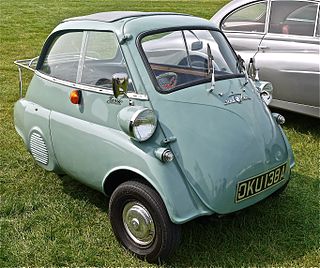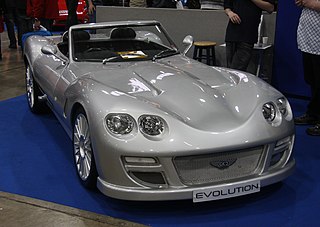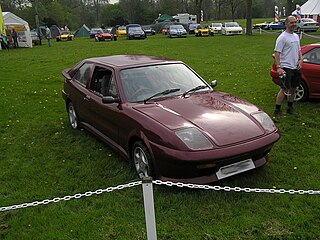Car components
The car uses a donor pack from a BMW 3 Series. The donor pack includes differential, half-shafts, brakes, steering column and lower steering shaft and if required, engine and gearbox. The chassis comes with BMW engine mounts already welded to the chassis to ease fitment.
Kits start at around £2,995, with an estimated build price from £8,000 (as of late 2008).
Fully built cars are also supplied to foreign markets, countering crash test requirements. Prices start at around £10,500, with the donor pack left to the customer to source. Or GKD can supply all the donor pack components to order.
The body shell is made from GRP fibreglass, with a bespoke chassis housing the engine and suspension.

A Locost is a home-built car. The car features a space frame chassis usually welded together from mild steel 1 in × 1 in square tubing. Front suspension is usually double wishbone with coil spring struts. The rear is traditionally live axle, but has many variants including independent rear suspension or De Dion tube. Body panels are usually fiberglass nose and wings and aluminium side panels. Each car is highly individualized according to the resources, needs and desires of each respective builder.

The Lotus Seven is a small, simple, lightweight two-seater open-top sports car produced by the British manufacturer Lotus Cars between 1957 and 1972.

A kit car is an automobile that is available as a set of parts that a manufacturer sells and the buyer then assembles into a functioning car. Usually, many of the major mechanical systems such as the engine and transmission are sourced from donor vehicles or purchased new from other vendors. Kits vary in completeness, consisting of as little as a book of plans, or as much as a complete set with all components to assemble into a fully operational vehicle such as those from Caterham.
Caterham Cars is a British manufacturer of specialist lightweight sports cars established in Caterham, Surrey, with their headquarters in Crawley, Sussex. Their current model, the Caterham 7, originally launched in 1973, is a direct evolution of the Series 3 Lotus Seven designed by Colin Chapman. In the 1990s the company made the Caterham 21, a two-seater soft top alternative to the MGF and Lotus Elise,. A track-only car, the SP/300.R, a joint project with Lola was released for customer testing in 2010 and was scheduled for release in 2013. On 27 April 2011, Team Lotus owner Tony Fernandes announced that he had purchased Caterham.

The Isetta is an Italian-designed microcar built under license in a number of different countries, including Argentina, Spain, Belgium, France, Brazil, Germany, and the United Kingdom. Because of its egg shape and bubble-like windows, it became known as a bubble car, a name also given to other similar vehicles.

The Caterham 7 is a super-lightweight sports car produced by Caterham Cars in the United Kingdom. It is based on the Lotus Seven, a lightweight sports car sold in kit and factory-built form by Lotus Cars, from 1957 to 1972.

Lotus Elan is the name of two separate ranges of automobiles produced by Lotus Cars.

ZF Friedrichshafen AG, also known as ZF Group, originally Zahnradfabrik Friedrichshafen, and commonly abbreviated to ZF, is a German car parts maker headquartered in Friedrichshafen, in the south-west German region of Baden-Württemberg.

Robin Hood Engineering Ltd was a British kit car manufacturer based in Mansfield Woodhouse, Nottinghamshire. The factory covered 30,000 square feet (2,800 m2) and was on a one and a half acre site.

The Austin 7 is an economy car that was produced from 1922 until 1939 in the United Kingdom by Austin. It was nicknamed the "Baby Austin" and was at that time one of the most popular cars produced for the British market and sold well abroad. Its effect on the British market was similar to that of the Model T Ford in the US, replacing most other British economy cars and cyclecars of the early 1920s. It was also licensed and copied by companies all over the world. The very first BMW car, the BMW Dixi, was a licensed Austin 7, as were the original American Austins. In France they were made and sold as Rosengarts. In Japan, Nissan also used the 7 design as the basis for their first cars, although not under licence. This eventually led to a 1952 agreement for Nissan to build and sell Austins in Japan under the Austin name.

The GKD EVOLUTION is a lightweight high-performance convertible sports car manufactured by British company GKD Sports Cars, based in Boughton Monchelsea, near Maidstone with workshops at Lenham. The EVOLUTION is available in component form, or fully built.

Commodore}}
Factory Five Racing, Inc. (F.F.R.) is an American automobile company that designs and manufactures assembly kits, chassis, bodies and related components for replicars and sports cars.

GKD Sports Cars is a small-volume car manufacturer based in Boughton Monchelsea, near Maidstone, Kent, with workshops at Lenham. GKD Sports Cars produce two models, the GKD Evolution and the GKD Legend.

Quantum Sports Cars was founded by Mark and Harvey Wooldridge in 1987.

Blakely Auto Works was a manufacturer of automobiles and of kit cars, working from premises located in a series of US midwest communities, including Princeton, Wisconsin, in the 1970s and 1980s. Blakely produced several kit car models, the Bantam, Bearcat, and Bernardi.
The Blakely Bantam was a kit car produced by Blakely Auto Works, a manufacturer of kit cars located in a series of US midwest communities in the 1970s and 1980s. Blakely Auto was founded by Dick Blakely to market affordable sports cars in the spirit of the legendary Lotus Seven: compact, lightweight, and with excellent handling. The Bantam's design inspiration was the Dutton, a Lotus Seven replica built in Britain. The Bantam was introduced in 1972 as Blakely's first offering, followed by the larger Bearcat and eventually by the Bernardi. Production of the Bantam continued into the 1980s, when the model was renamed the Hawk, and stopped with the dissolution of Bernardi Auto Works in the later 1980s.

Haynes Roadster is a replica of Lotus Seven home-built according to a book Build Your Own Sports Car: On a Budget by Chris Gibbs (ISBN 1-84425-391-0). Ford Sierra is used in the car as a donor for drivetrain and suspension components.
Mills Extreme Vehicles (MEV) is a kit car design and manufacturing company based in Gloucestershire, England, founded in 2003. As of January, 2016 they manufacture the Exocet, an exoskeletal design which uses donor parts from the Mazda MX5 Mk1 sports car. An enhanced version of the Exocet, the MX150R, can participate in UK race series regulated by the 750 Motor Club and the MSA.














